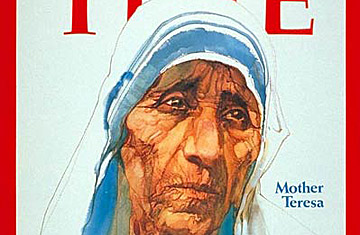
Mother Teresa
(9 of 10)
Now 78, Dorothy Day still presides over the Catholic Worker Movement from her tattered but vital hospice for the poor, St. Joseph's House, just off Manhattan's Bowery. Today 47 urban "houses of hospitality," inspired by the one she founded in New York, provide hot meals, and sometimes shelter, for the down-and-out. Some are tied to companion farms in the country in keeping with the back-to-the-land ideas of Co-Founder Peter Maurin.
Saintly people who focus attention on oppression can expect to pay for their actions. In South Africa, criticism of the country's racist policies has brought a harsh punishment to Dutch Reformed Minister C.F. Beyers Naude. Pastor Naude, now 60, was a prominent, rising churchman and Afrikaner supremacist until the 1960 Sharpeville massacre prodded his conscience. He forthwith set to work to destroy his church's theological approval of apartheid. Naude is now barred from the pulpit, ostracized, harassed by government prosecutors and denied his passport. Still, he says that being an outsider in his own society is "what God requires of me."
The U.S. has its own civil rights heroes. John Lewis, 35, the young apostle of nonviolence in the '60s, was arrested more than 40 times in civil rights demonstrations, and his skull was fractured at Selma in 1965. Since 1970 he has headed the Voter Education Project in Atlanta and helped register some 3.5 million blacks. As a Baptist seminarian, Lewis was kidded for talking up the Social Gospel, but he insists that some "immutable principles" must be at the base of the "Beloved Society" he envisions, and nonviolence is one of them. If a compassionate world is the end, he argues, "then the means we use must be consistent with it."
Perhaps the most widely revered political saint today is Brazil's Dom Helder Pessoa Càmara, Archbishop of Olinda and Recife (TIME, June 24, 1974) and partisan of the poor. No better testimony for Dom Helder exists than the witness of those who have suffered in his behalf. Former Methodist Missionary Fred Morris, who last year was tortured by Brazilian authorities at least partly because of his friendship with Dom Helder, puts it simply. "Being with him, watching him, listening to him, one is less and less aware of him and increasingly aware of the reality to which he points—a God who cares about the little people of the earth."
But must a contemporary saint be an activist? The Rev. George Webber, president of Manhattan's New York Theological Seminary, says yes: "When I think of a saint today, I think of a person who is willing to spend his whole life in a struggle for justice." Yet Monsignor Francis Lally, a member of the U.S. bishops conference staff, offers a gentle demurrer. "A saint is a person who puts himself in the service of others for spiritual reasons," he says. Just how one accomplishes that, adds Lally, may vary from age to age. "The activist has taken over, but I think we're swinging back toward the mystic."
